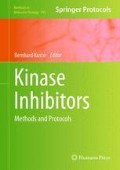Abstract
Mutations in the LRRK2 (Leucine-Rich Repeat Kinase 2) gene are the most common cause of autosomal dominant Parkinson’s disease. LRRK2 has multiple functional domains including a kinase domain. The kinase activity of LRRK2 is implicated in the pathogenesis of Parkinson’s disease. Developing an assay to understand the mechanisms of LRRK2 kinase activity is important for the development of pharmacologic and therapeutic applications. Here, we describe how to measure in vitro LRRK2 kinase activity and its inhibition.
Access this chapter
Tax calculation will be finalised at checkout
Purchases are for personal use only
References
Braak, H., Del Tredici, K., Rub, U., de Vos, R. A., Jansen Steur, E. N., and Braak, E. (2003) Staging of brain pathology related to sporadic Parkinson’s disease. Neurobiol Aging 24, 197–211.
Morris, H. R. (2005) Genetics of Parkinson’s disease. Ann Med 37, 86–96.
Lesage, S., and Brice, A. (2009) Parkinson’s disease: from monogenic forms to genetic susceptibility factors. Hum. Mol. Genet. 18, R48–59.
Elbaz, A. (2008) LRRK2: bridging the gap between sporadic and hereditary Parkinson’s disease. Lancet Neurol. 7, 562–564.
Haugarvoll, K., Rademakers, R., Kachergus, J. M., Nuytemans, K., Ross, O. A., Gibson, J. M., Tan, E. K., Gaig, C., Tolosa, E., Goldwurm, S., Guidi, M., Riboldazzi, G., Brown, L., Walter, U., Benecke, R., Berg, D., Gasser, T., Theuns, J., Pals, P., Cras, P., De Deyn, P. P., Engelborghs, S., Pickut, B., Uitti, R. J., Foroud, T., Nichols, W. C., Hagenah, J., Klein, C., Samii, A., Zabetian, C. P., Bonifati, V., Van Broeckhoven, C., Farrer, M. J., and Wszolek, Z. K. (2008) Lrrk2 R1441C parkinsonism is clinically similar to sporadic Parkinson disease. Neurology 70, 1456–1460.
Change, N., Mercier, G., and Lucotte, G. (2008) Genetic screening of the G2019S mutation of the LRRK2 gene in Southwest European, North African, and Sephardic Jewish subjects. Genet. Test. 12, 333–339.
Tan, E. K., Tan, L. C., Lim, H. Q., Li, R., Tang, M., Yih, Y., Pavanni, R., Prakash, K. M., Fook-Chong, S., and Zhao, Y. (2008) LRRK2 R1628P increases risk of Parkinson’s disease: replication evidence. Hum. Genet. 124, 287–288.
Tomiyama, H., Mizuta, I., Li, Y., Funayama, M., Yoshino, H., Li, L., Murata, M., Yamamoto, M., Kubo, S., Mizuno, Y., Toda, T., and Hattori, N. (2008) LRRK2 P755L variant in sporadic Parkinson’s disease. J. Hum. Genet. 53, 1012–1015.
Floris, G., Cannas, A., Solla, P., Murru, M. R., Tranquilli, S., Corongiu, D., Rolesu, M., Cuccu, S., Sardu, C., Marrosu, F., and Marrosu, M. G. (2009) Genetic analysis for five LRRK2 mutations in a Sardinian parkinsonian population: Importance of G2019S and R1441C mutations in sporadic Parkinson’s disease patients. Parkinsonism Relat. Disord. 15, 277–280.
Gorostidi, A., Ruiz-Martinez, J., Lopez de Munain, A., Alzualde, A., and Marti Masso, J. F. (2009) LRRK2 G2019S and R1441G mutations associated with Parkinson’s disease are common in the Basque Country, but relative prevalence is determined by ethnicity. Neurogenetics 10, 157–159.
Patra, B., Parsian, A. J., Racette, B. A., Zhao, J. H., Perlmutter, J. S., and Parsian, A. (2009) LRRK2 gene G2019S mutation and SNPs [haplotypes] in subtypes of Parkinson’s disease. Parkinsonism Relat. Disord. 15, 175–180.
Zimprich, A., Biskup, S., Leitner, P., Lichtner, P., Farrer, M., Lincoln, S., Kachergus, J., Hulihan, M., Uitti, R. J., Calne, D. B., Stoessl, A. J., Pfeiffer, R. F., Patenge, N., Carbajal, I. C., Vieregge, P., Asmus, F., Muller-Myhsok, B., Dickson, D. W., Meitinger, T., Strom, T. M., Wszolek, Z. K., and Gasser, T. (2004) Mutations in LRRK2 cause autosomal-dominant parkinsonism with pleomorphic pathology. Neuron 44, 601–607.
Greggio, E., Jain, S., Kingsbury, A., Bandopadhyay, R., Lewis, P., Kaganovich, A., van der Brug, M. P., Beilina, A., Blackinton, J., Thomas, K. J., Ahmad, R., Miller, D. W., Kesavapany, S., Singleton, A., Lees, A., Harvey, R. J., Harvey, K., and Cookson, M. R. (2006) Kinase activity is required for the toxic effects of mutant LRRK2/dardarin. Neurobiol. Dis. 23, 329–341.
Smith, W. W., Pei, Z., Jiang, H., Dawson, V. L., Dawson, T. M., and Ross, C. A. (2006) Kinase activity of mutant LRRK2 mediates neuronal toxicity. Nat. Neurosci. 9, 1231–1233.
Cookson, M. R., Dauer, W., Dawson, T., Fon, E. A., Guo, M., and Shen, J. (2007) The roles of kinases in familial Parkinson’s disease. J. Neurosci. 27, 11865–11868.
West, A. B., Moore, D. J., Choi, C., Andrabi, S. A., Li, X., Dikeman, D., Biskup, S., Zhang, Z., Lim, K. L., Dawson, V. L., and Dawson, T. M. (2007) Parkinson’s disease-associated mutations in LRRK2 link enhanced GTP-binding and kinase activities to neuronal toxicity. Hum. Mol. Genet. 16 pp. 223–232.
West, A. B., Moore, D. J., Biskup, S., Bugayenko, A., Smith, W. W., Ross, C. A., Dawson, V. L., and Dawson, T. M. (2005) Parkinson’s disease-associated mutations in leucine-rich repeat kinase 2 augment kinase activity. Proc. Natl. Acad. Sci. USA 102, 16842–16847.
Gloeckner, C. J., Kinkl, N., Schumacher, A., Braun, R. J., O’Neill, E., Meitinger, T., Kolch, W., Prokisch, H., and Ueffing, M. (2006) The Parkinson disease causing LRRK2 mutation I2020T is associated with increased kinase activity. Hum. Mol. Genet. 15, 223–232.
Covy, J. P., and Giasson, B. I. (2009) Identification of compounds that inhibit the kinase activity of leucine-rich repeat kinase 2. Biochem. Biophys. Res. Commun. 378, 473–477.
Acknowledgments
This work was supported by the USPHS P50NS038377 and R01NS048206. T.M.D. is the Leonard and Madlyn Abramson Professor in Neurodegenerative Diseases at Johns Hopkins.
Author information
Authors and Affiliations
Corresponding author
Editor information
Editors and Affiliations
Rights and permissions
Copyright information
© 2012 Springer Science+Business Media, LLC
About this protocol
Cite this protocol
Lee, B.D., Li, X., Dawson, T.M., Dawson, V.L. (2012). Measuring the Activity of Leucine-Rich Repeat Kinase 2: A Kinase Involved in Parkinson’s Disease. In: Kuster, B. (eds) Kinase Inhibitors. Methods in Molecular Biology, vol 795. Humana Press. https://doi.org/10.1007/978-1-61779-337-0_3
Download citation
DOI: https://doi.org/10.1007/978-1-61779-337-0_3
Published:
Publisher Name: Humana Press
Print ISBN: 978-1-61779-336-3
Online ISBN: 978-1-61779-337-0
eBook Packages: Springer Protocols

